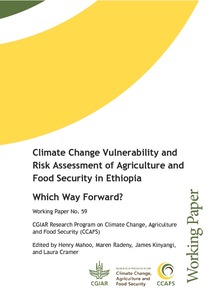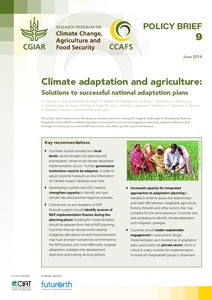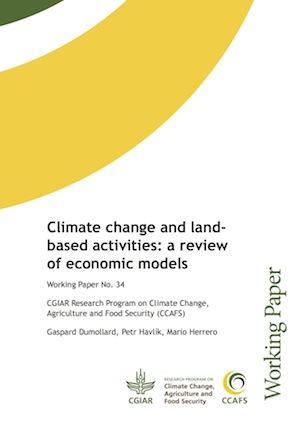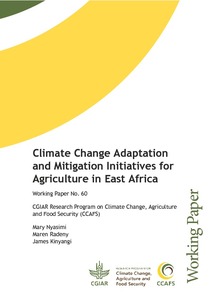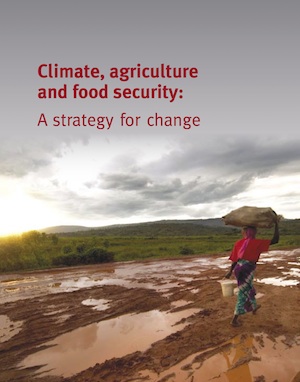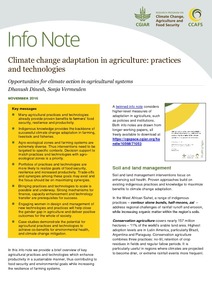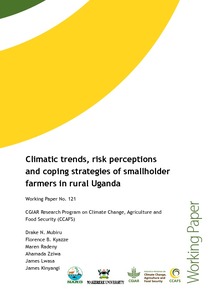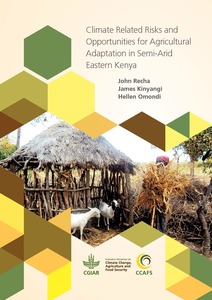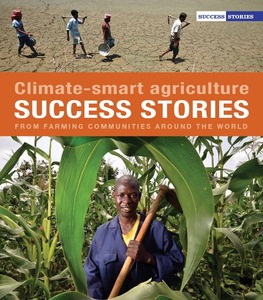Climate adaptation and agriculture: Solutions to successful national adaptation plans
The purpose of this brief is to share insights on agriculture and NAPs with national-level decision makers in developing countries and Least Developed Countries (LDCs), multilateral agencies, UNFCCC negotiators and donors. This brief explores how countries are overcoming the biggest challenges in developing NAPs, outlines examples of successful cross-sector adaptation planning, explores influence and leverage necessary for successful NAP processes, and offers specific recommendations.
Climate change, agriculture and food security: a comparative review of global modelling approaches
The dual relationship existing between land-based activities and climate change has long been established. Land-based activities are responsible for about 30% (IPCC) of global GHG emissions and are at the same time particularly impacted by climate change as they are strongly dependent on weather patterns. Although physical and technical considerations may help to investigate these two kinds of issues, economic considerations are crucial to understand how agricultural producers react to climate change and to climate policies.
Climate change adaptation and mitigation initiatives for agriculture in East Africa
National governments across East Africa are in the process of formulating and implementing adaptation and mitigation strategies to assist farmers cope with climate change. These include formulating actions, frameworks and programs to address climate change and embedding these within the long-term national development plans.
Climate change, agriculture and food security: a strategy for change
Agriculture – on which we all depend for our food – is under threat from climate change. There is no doubt that systems worldwide will have to adapt, but while consumers may barely notice in developed countries, millions of people in developing countries face a very real and direct threat to their food security and livelihoods. Even without climate change, many agricultural systems in developing countries are nearing crisis point. Feeding a rapidly rising global population is taking a heavy toll on farmlands, rangelands, fisheries and forests. Water is becoming scarce in many regions.
Climate change adaptation in agriculture: practices and technologies. Opportunities for climate action in agricultural systems
In this info note we provide a brief overview of key
agricultural practices and technologies which enhance
productivity in a sustainable manner, thus contributing to
food security and environmental goals while increasing
the resilience of farming systems.
A twinned info note considers
higher-level measures of
adaptation in agriculture, such
as policies and institutions. Updated: November 2016.
Both info notes are drawn from
longer working papers, all
freely available to download at
Climatic trends, risk perceptions and coping strategies of smallholder farmers in rural Uganda
Smallholder farmers in Uganda face a wide range of agricultural production risks, with climate change and variability presenting new risks and vulnerabilities. Climate related risks such as prolonged dry seasons have become more frequent and intense with negative impacts on agricultural livelihoods and food security.
Collaborative projet rice improvement Annual Report 1999
Climate readiness in smallholder agricultural systems: lessons learned from REDD+
The debate around the role that agriculture should play in mitigating climate change and sequestering greenhouse gases is politically complex and technically complicated. In many countries, and particularly in developing countries with a large smallholder population, the agricultural sector faces competing priorities, such as national food security goals, poverty alleviation, addressing natural resource degradation and adapting to the already visible effects of climate change.
Climate Related Risks and Opportunities for Agricultural Adaptation in Semi-Arid Eastern Kenya.
This report contains information on a field assessment of risks associated with climate variability in eastern Kenya. It also includes the compilations of climate related agricultural risks gathered from a Kamba radio dialogue with local communities of Eastern Kenya, aired from January to April 2012. It highlights the significant potential in the region for mitigating climate change through improved management of agricultural land and crop and livestock husbandry practices, as well as on tapping into the wide range of traditional knowledge of the local communities.
Climate Smart Agriculture in the African Context
Agriculture remains vital to the economy of most African countries and its development
has significant implications for food security and poverty reduction in the region. Increase
in agricultural production over the past decades has mainly been due to land area expansion,
with very little change in production techniques and limited improvement in yields.
Currently one in four people remains malnourished in Africa. CSA integrates all three dimensions of sustainable development and is aimed at (1)
Climate-smart agriculture success stories from farming communities around the world
To ensure a food-secure future, farming must become climate resilient. Around the world, governments and communities are adopting innovations that are improving the lives of millions while reducing agriculture’s climate footprint. These successful examples show the many ways climate-smart agriculture can take shape, and should serve as inspiration for future policies and investments.

